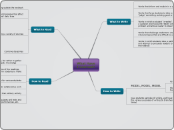Mind Map - Strategies for Struggling Readers/Writers

What Have
I Learned?
How to Read
Assessment relies less on quizzes and tests and
more on complex projects/perfomances, etc.
Make reading a social activity rather than solitary activity
Allow opportunities for collaborative work
Differentiate texts for various students
Teacher selects some of the readings,
while also allowing for students to make
own choices
Not to pass a test, but rather to gather
information and apply knowledge
What to Read
Combine disciplines
Using a variety of sources
Websites
Newspaper Articles
Magazines
Textbook
Using real world samples that affect
young students' daily lives
Venturing outside the textbook
How to Write
Give students samples of writing, and have them hunt for the various purposes of writing (6 branches of What to Write)
MODEL, MODEL, MODEL
Show students mentor texts
from real-world situations
As a teacher, model the strategy
What to Write
Works in which students take a particular position
and attempt to persuade readers to agree with
their stance
Works that challenge students to analyze and
interpret topics that are difficult to understand
Works in which a student "wrestles" with
a question and hooks the reader with the
problem and allows reader to observe
Works that force students to take a stance or
"judge" something as being good or bad
Works that inform and explain in a unique way
Works that allow students to express
and reflect upon their own life experiences

